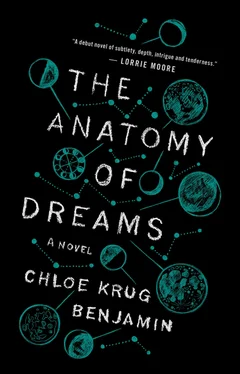• • •
On New Year’s Eve, we gathered in the dorm common room with a bottle of Jack Daniels to watch the Times Square special. The dorm had been decorated with shiny, metallic streamers, as if matte colors had become outmoded along with grunge and floppy disks. We’d heard rumors of a problem known as Y2K, or the millennium bug—a technology crash that could paralyze everything from air traffic control to elevators, since computer systems had only been wired to support a two-digit year. On TV, the Times Square ball hung seventy-seven feet aboveground, and we wondered if this would fail, too, and stay suspended atop the flagpole when midnight turned.
We passed around a crumpled article that someone had found online and pinned to the common room bulletin board. It was a piece from the December 1900 issue of Ladies’ Home Journal, written by John Elfreth Watkins Jr. and called “What May Happen in the Next Hundred Years.”
“These prophecies will seem strange,” wrote Mr. Watkins, “almost impossible. Yet they have come from the most learned and conservative minds in America.” And given the century’s lapse in time, we were all pretty impressed by what Mr. Watkins’s learned minds got right. Sure, strawberries weren’t as large as apples, as some had predicted they would be, and flies did, in fact, still exist. But it was true that automobiles had been substituted for horses, that weapons could destroy whole cities, that photographs could be taken at any distance and replicate all of nature’s colors. It was true, too, that there were airships to transport people and goods, but also to act as war vessels and to make observations at great heights above earth. Man had also seen around the world, via what would become the television: “The instrument bringing these distant scenes to the very doors of people will be connected with a giant telephone apparatus,” he wrote, “transmitting each incidental sound in its appropriate place. Thus the guns of a distant battle will be heard to boom when seen to blaze, and thus the lips of a remote actor or singer will be heard to utter words or music when seen to move.”
Heard to boom when seen to blaze— these words looped through my head that night, their old rhythm and their poetry. There was something haunting about Watkins and the human capacity to predict the future, as much as it seemed to elude us. And the predictions that hadn’t yet been realized—were they still to come? That winter could be turned into summer and night into day? What of prediction number twenty-eight, his forecast for the animals?
There will be no wild animals except in menageries. Rats and mice will have been exterminated. The horse will have become practically extinct. Cattle and sheep will have no horns. Food animals will be bred to expend practically all their life energy in producing meat, milk, wool and other by-products. Horns, bones, muscles and lungs will have been neglected.
It disturbed me more than the others—the animals gutted, made impotent, stripped of their dignity and their defenses. When the countdown began, my breath caught in my throat. As much as I’d scoffed at rumors of the Tribulation, even of the technology crash, what would happen if I was wrong? If human beings vanished, and so did our consciousness of the world—our inventories of plants and insects and endangered birds, our ability to predict weather patterns and measure whole populations—would the planet still know itself? Or would it be better off without our predictions and the ways we made them come true?
But at midnight, the ball slid easily to the ground at One Times Square. The dorm elevators rose and fell just as they had before. That night, before bed, I pressed my face to the sliver of window beside my bunk and watched as a plane flew by, blinking faintly in the darkness.
• • •
By sophomore year, my old interest in physics had flagged, and I’d decided to become a psychology major. Maybe Keller’s classes at Mills had ruined me, or perhaps I simply lost interest in the consistency of numbers. Either way, the laws of motion could no longer compete with the thrill of studying other people. The laws of human beings were counterintuitive and absurd, broken as often as they were followed.
In the spring, my adviser suggested a class in the film department. Painting 201 conflicted with my abnormal psych requirement, and she’d heard good things about Intro to Videography.
“At the very least, it’ll give you some good material,” she said, leaning forward. “It’s sanctioned people-watching. Legal voyeurism! A few of my kids got a lot out of it.”
Her hair was brown except for an inch-wide silver chunk, as if she’d streaked it that way on purpose. She wore a shawl with various hanging bobbles that shook when she spoke emphatically. The walls in her office were hung with woven Peruvian tapestries and framed diplomas and grisly portraits of human beings in various states of psychic pain. Though she looked too old to have young children, she had recently adopted twin four-year-old boys from Indonesia. When I saw her around campus, she stared at me with her head cocked, as though wondering whether I was somebody else.
She amazed me as much as she terrified me. The next day, I signed up for videography. I gave up painting with only a small pang—it had never stopped reminding me of Gabe. Film was a relief, for I didn’t have to create the material; I just had to capture it. That spring, I got a job as an audiovisual technician at the university, taping speech courses and oral presentations. Sometimes the professors greeted me, but often they continued talking as I set up at the back of the room, as if I required no more acknowledgment than the camera. I felt like a professional ghost. In my free time, I rented a camera from the media center and carted it as far as I could. I filmed the punk girls on Telegraph, the yolky desserts at the Russian bakery, the couples twined together in front of Sather Tower.
In the August before my junior year, I moved into a one-bedroom with David, a graduate student I’d been dating since the previous semester. My parents weren’t entirely pleased, but I was dying to get out of the dorms, having spent four years in them during high school, and my AV job enabled me to pay my share of the rent. It was a stout, twelve-unit building with peeling beige paint and a purple burst of a garden; our galley kitchen was so narrow that I could only open the refrigerator door partway before it hit an opposing cabinet. Often we ordered in from the dim sum restaurant down the block, filling David’s Ikea plates with shrimp dumplings and steamed buns, lo mai gai wrapped in lotus leaves. I did homework for my psychology courses or edited videos, and I began to read fiction—something I had never enjoyed before but that now gave me a heady feeling of adventure.
David worked on the font he’d created, the cornerstone of his dissertation in graphic design. I liked his even demeanor and his realism. Our similarities were comforting—or perhaps it comforted me to think we were similar. David didn’t ask about Mills. He seemed to assume that high school was as ancient a memory for me as it was for him. At night, we slept in his double bed, and he was always there in the morning, his hands crossed over his chest like a corpse.
Every so often, I received an e-mail from Hannah, who was majoring in environmental science at Colorado College ( Happy N-Y! How was your x-mas? I sat on a mountaintop—drank champagne, made drunken angels in the snow. Heaven ). We talked on the phone sporadically, but by senior year, we’d lost touch almost completely. She was happy to hear about David; once she said, “God, remember Gabe ?” her tone conspiratorial and incredulous, as if he were a once-beloved leader or celebrity who had come to a disreputable end.
Читать дальше












